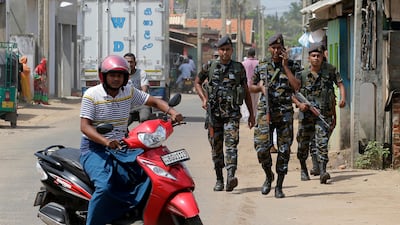A majority-Christian city in Sri Lanka known as "Little Rome" has been rocked by clashes between Christians and Muslims after the Easter Sunday attacks claimed by ISIS killed 257 people.
The Roman Catholic Church has called for calm after Christians attacked Muslim-owned shops, homes and vehicles in Negombo.
Cardinal Malcolm Ranjith, Archbishop of Colombo, made an appeal in a video message to the country.
"I appeal to all Catholic and Christian brothers and sisters not to hurt even a single Muslim person because they are our brothers, because they are part of our religious culture," said Cardinal Ranjith said.
"Therefore please stop hurting them and try to create a better spirit of understanding and good relations between all the communities of Sri Lanka."
Negombo’s main church, St Sebastian’s, a building modelled on the cathedral in the French town of Reims, was targeted by a suicide bomber who killed more than 100 people at an Easter Mass.
The church, 40 kilometres north of the capital Colombo, was one of three churches hit alongside three luxury hotels on April 21.
But it suffered the highest death toll of any site struck that day by eight ISIS-inspired suicide bombers.
The mob attacks add to fears that the suicide bombings would widen religious and ethnic divisions in Sri Lanka, which has lived in relative peace since the war between the government and the separatist Tamil Tigers ended in 2009.
Cardinal Ranjith visited Negombo, held talks with clerics at a mosque and appealed to the government to shut bars in the city, spokesman Father Edmund Tilakaratne said.
"As a temporary measure, the cardinal asked the government to order the ban on liquor sales in Negombo area," Fr Tilakaratne said.
In another televised appeal, Cardinal Ranjith appealed to Christians, Buddhists and Muslims to show restraint.
A top police official said two arrests were made after the latest clashes and more suspects had been identified through security camera footage.
The officer said all will be prosecuted under emergency laws approved after the Easter attacks.
"At least three people were injured in the clashes," he said. "Although we have arrested only two suspects at the moment, many more have been identified and we will go after them."
The officer said an alcohol-fuelled dispute between two groups degenerated into the clashes.
Prime Minister Ranil Wickremesinghe said the government would compensate those who lost property in the clashes.
Video on social media showed mobs throwing stones at Muslim businesses, destroying furniture inside homes, shattering windows and overturning vehicles.
Hundreds of extra troops and police were sent late on Sunday as authorities imposed a night-time curfew in the town.
The government blocked access to WhatsApp, Facebook and other social media platforms for several hours to prevent the spread of rumours and videos aimed at causing unrest.
The curfew was lifted on Monday morning and social media was working again by noon.

